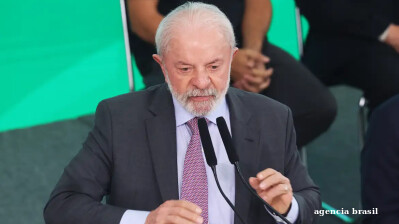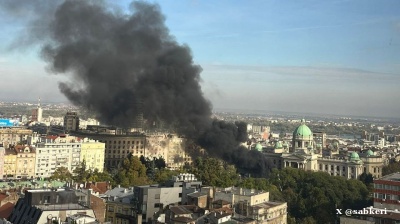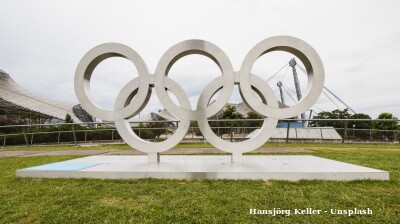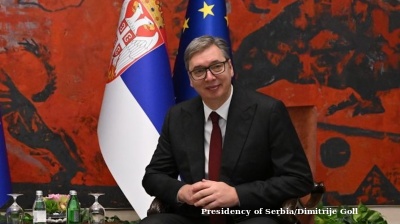European foreign ministers gathered in Copenhagen to discuss a number of issues with holding Russia to account for the war with Ukraine at the top of the agenda.
EU foreign policy chief and former Estonian Prime Minister Kaja Kallas listed the issues: fast tracking Ukraine’s EU membership, confiscating the approximately $200bn of Russian central bank money frozen in Belgium’s Euroclear, and hard security guarantees for Ukraine including a 40km wide buffer zone, and switch to majority voting in the European parliament.
The meeting covered more than just Ukraine, but little progress is expected on the Ukrainian points discussed. Most of them are problematic, but the EU’s plan to support Ukraine going forward turns on the need to persuade the White House to at least “backstop” the EU’s effort. US President Donald Trump has said repeatedly that he is not interested and since he took over he has ended all financial and weapons support, other than what the European Nato allies are willing to pay for. At the same time deep divisions remain amongst the EU members themselves.
“At today’s EU foreign ministers’ meeting in Copenhagen it became clear that Brussels and most member states are preparing for a long war, not peace. They want to send tens of billions of euros to Ukraine for soldiers’ salaries, drones, weapons, and the operation of the Ukrainian state,” Hungarian Foreign Minister Peter Szijjarto wrote on social media as the meetings got underway.
Hungarian Prime Minister Viktor Orban has made keeping Ukraine out of the EU and ending the military and financial support a major plank of his re-election campaign ahead of a vote next year.
In general, the difference between the SCO meeting and that of the EU foreign ministers in Copenhagen highlights how the BRICS members are increasingly coming together to coordinate their actions and work more closely together. In contrast the Western alliance that only a year ago was a tightly coordinated US-EU27 alliance, has broken up. Cooperation between the US and the EU on Ukraine is now minimal and as it has been excluded from the US-led peace talk efforts, its decisions are increasingly irrelevant. The EU itself has been largely reduced to the leadership of the so-called E3 (France, Britain and Germany) and what is left of the membership in the coalition of the willing.
“There were two large-scale attacks by Russia this week—absolutely brazen actions, through which Russia is demonstrating that without pressure from the world, there will be no end to the war," Ukrainian President Volodymyr Zelenskiy said in an address on the eve of the SCO meeting. "And these are all clear signals to the United States, to Europe, and to the leaders who these days are in China and will be meeting with Putin."
US support: the EU leaders called on the US to back their efforts to increase the pressure on Russia and reach “peace through strength.” A bi- or tri-lateral meeting involving Russia, the US and Ukraine has been suggested but the actual meeting seems as far away as ever as little progress has been made since the Alaska and Washington summits this month.
However, French Foreign Minister Jean-Noël Barrot told journalists ahead of the meeting that the European initiatives will only truly be effective if Washington joins in on the effort to pressure Putin – something that the Trump administration has shown itself reluctant to do.
“If in a few days, at the end of the two-week period he had indicated to [US] President [Donald] Trump, Vladimir Putin continues to oppose a high-level meeting with the president of Ukraine, then we will need to force by hardening sanctions — sanctions from the United States, but also European sanctions,” Barrot told reporters in Copenhagen, as cited by Politico, referring to Trump’s two-week deadline set on August 22.
Indeed, the US and EU are on such different trajectories now that senior White House officials said over the weekend that some European leaders are publicly supporting President Trump's effort to end the war in Ukraine, while “quietly trying to undo behind-the-scenes progress” since the Alaska summit, Axios reports.
According to Axios, "White House officials are losing patience with European leaders, whom they claim are pushing Ukraine to hold out for unrealistic territorial concessions by Russia." Moreover, "Trump aides contend the blame should fall on European allies, not on Trump or even Russian President Vladimir Putin."
Frozen funds: Europe is running out of money to fund the $100bn a year war in Ukraine and the frozen Russian assets is a tempting pool of cash that in theory can simply be seized, but confiscating them now is not politically realistic, EU foreign policy chief and former Estonian Prime Minister Kaja Kallas said on August 30.
Kallas said in the run up to the meeting that the money cannot be returned to Russia until after it has paid reparations.
However, there are many technical, legal and reputational problems with confiscating the Central Bank of Russia (CBR)’s money, which remains very unlikely to happen.
The reserves have been frozen, but technically they still belong to the central bank. Seizing them would be illegal under international law unless the EU declares war on Russia, and bankers worry that simply confiscating them would undermine the credibility of the euro, lead to capital flight and destabilise the European banking sector.
Most Western European countries, including Germany, Italy and Belgium, are resisting the confiscation plan. Belgium is the home to Euroclear where the assets are held and is particularly exposed to any legal and financial risks.
Despite these worries, the EU leaders are reportedly testing the water amongst member states for moving the assets into riskier investments that could generate more profits for Ukraine. The drawback with this plan is that it will leave the member states liable for any losses if the investments go bad.
Supporters of the scheme also see it as a step toward simply seizing the assets and handing them over to Ukraine if Russia refuses to pay post-war compensation.
Finding money to pay for Ukraine’s war is becoming a major headache for the recession bound EU. France and the UK are both facing financial crises and have said in the last week they may be forced to ask for International Monetary Fund (IMF) bailouts.
At the same time Ukraine is facing an estimated €8bn-€16bn budget shortfall in 2026 without more EU help, which are looking for new ideas to continue funding the war-battered country. The Trump administration has said repeatedly that it will provide Ukraine with no more money and any weapons it supplies will have to be paid for by Europe’s Nato members.
Buffer zone: The EU leaders have also suggested the establishment of a 40km buffer zone between Ukrainian and Russian forces that would form a demilitarised zone (DMZ) between the two armies that would be patrolled by the mooted peacekeepers. Moscow has reportedly expressed support for the buffer zone Politico reports, but it has repeatedly and clearly voiced its objections to Nato-backed soldiers on Ukrainian soil. Russia has similar plans for a buffer zone along its borders close to the Kursk region that Ukraine invaded last summer.
The idea of peacekeepers was first floated in April by French President Emmanuel Macron but soon abandoned as unworkable. Now the proposal has resurfaced and would involve deploying between 4,000 and 60,000 EU and Armed Forces of Ukraine (AFU) troops to patrol the demilitarised corridor. No countries have formally committed forces, although both France and the UK have said they would commit forces. US President Donald Trump has rejected any American troop involvement, as have Germany and Italy.
Unanimity vote: Another item on the agenda is to drop the requirement for all European parliament votes to be unanimous and switch to majority voting.
Under the current system, every EU member has in effect a veto over any decision – a fact that Hungary in particular has taken advantage of to block Ukraine’s EU accession bid and squeeze numerous concessions out of the European Commission (EC).
French President Emmanuel Macron and former German Chancellor Angela Merkel tried to change the system by forcing through a vote to switch to majority voting in 2021, but it was quickly voted down by the smaller states, afraid of losing their influence in the bloc.
News

Switzerland reopens Baghdad embassy after 30-year closure
Switzerland reopened its Baghdad embassy after 30 years, with Iraqi and Swiss foreign ministers officiating ceremony reflecting confidence in Iraq's stability and signalling expanded economic cooperation.

Brazil's Lula announces fourth presidential run at 80
Brazilian President Luiz Inácio Lula da Silva has announced he will seek re-election in October 2026, confirming his candidacy during a state visit to Indonesia on October 23.

Serbian president blames opposition for “terrorist attack” outside parliament
President Vucic blamed opposition groups for what he described as a “terrorist act” outside the National Assembly in Belgrade, after a 70-year-old man opened fire on a camp of government supporters and set fire to one of their tents.

IOC sanctions Indonesia over Israel visa ban
The International Olympic Committee has announced that international sports federations will be advised not to hold competitions or meetings in Indonesia after the country barred Israeli athletes from entering.




